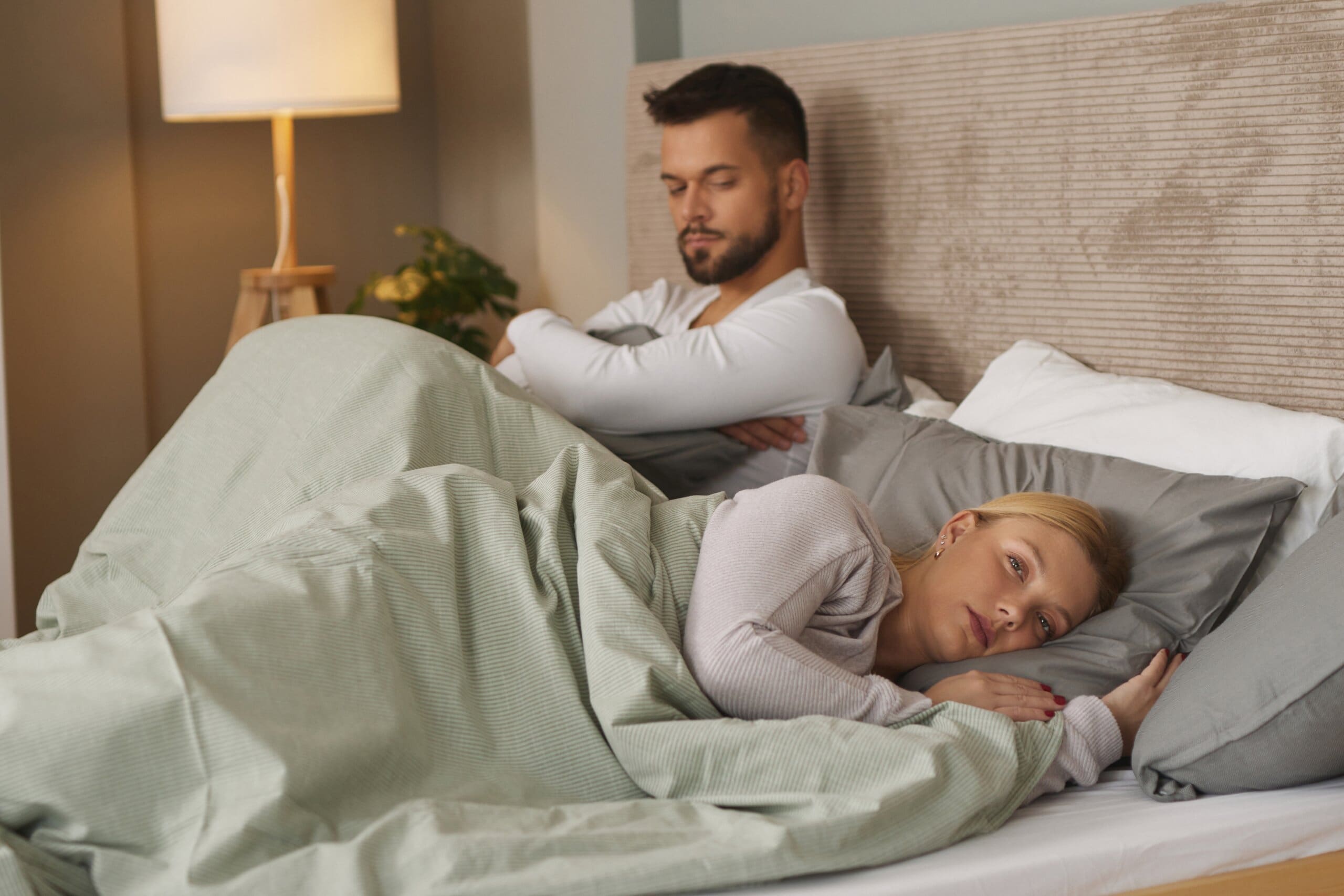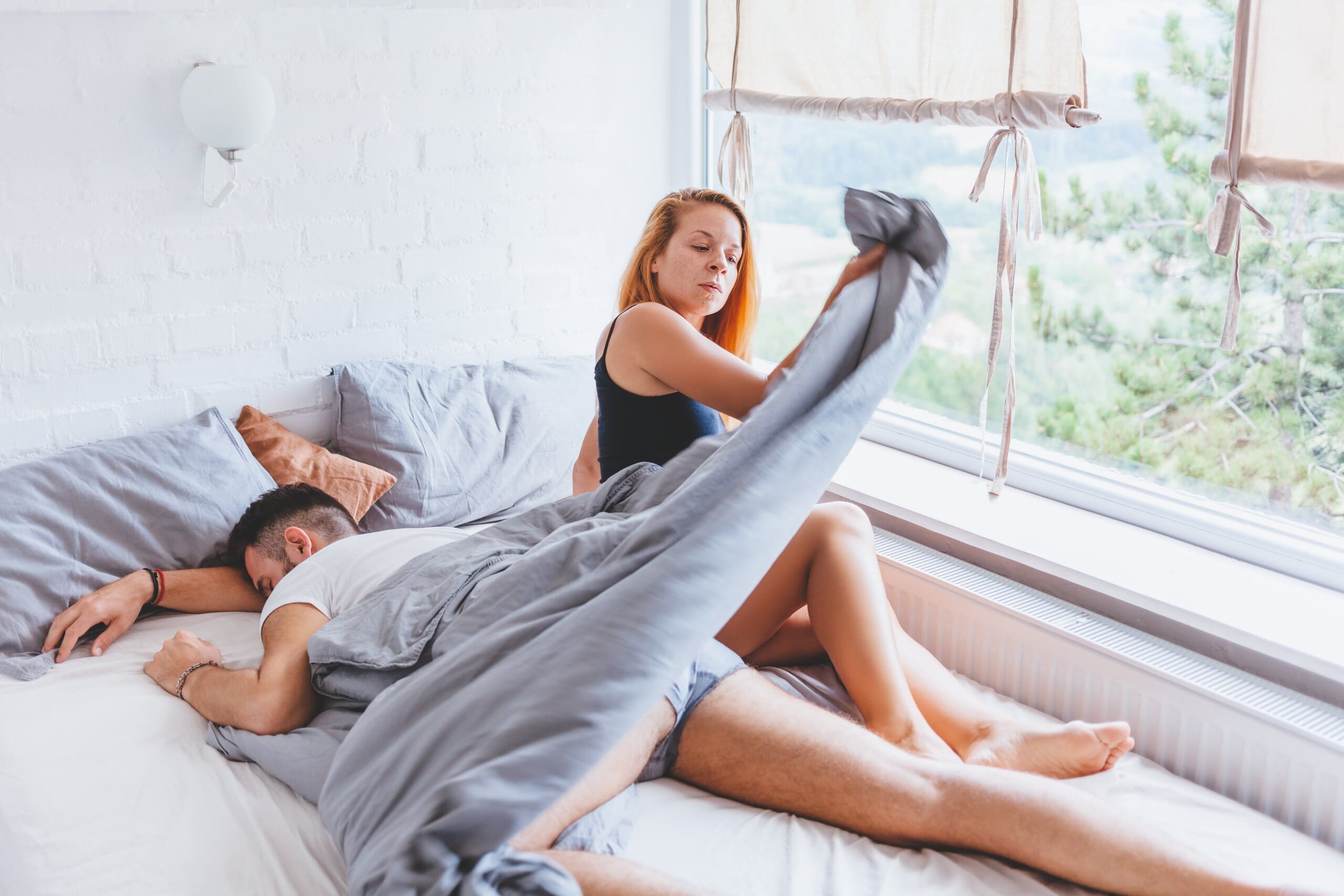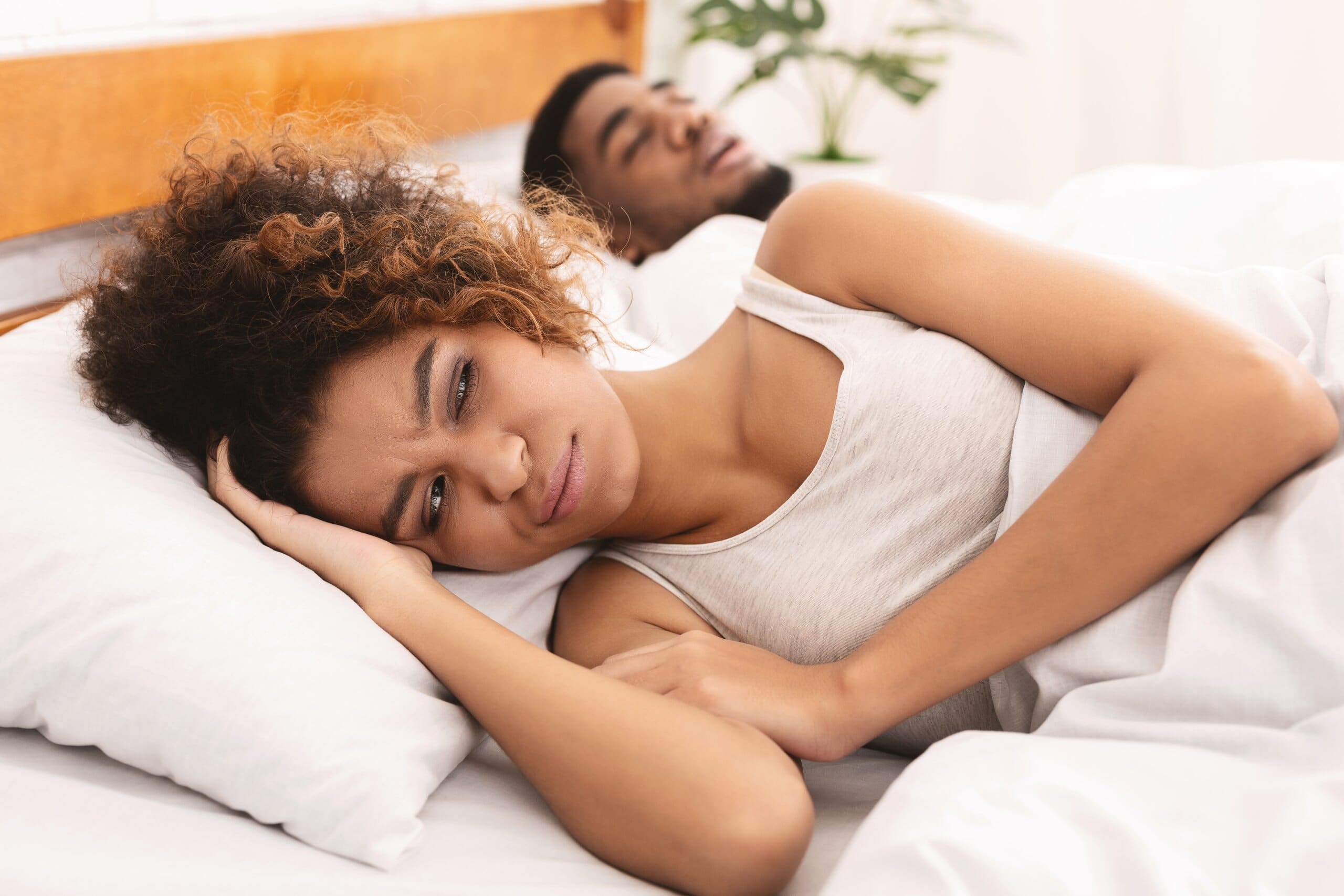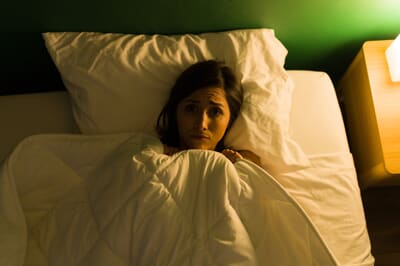Do you sleep with your partner or have separate bedrooms? Recently, more Brits said they sleep better alone than with another person. And, women are more likely to need separate bedrooms than men. This isn’t surprising when you realise that up to 30% of the world’s population suffers from some form of insomnia.
Sleep is important, but what do you do if your partner has annoying sleep habits that keep you awake? In the interests of the nation, we ran a competition, asking people to share their partner’s worst sleeping habits to crown the worst sleeper (and the person most deserving of a new mattress).

9pm is the time when most couples face off against their sleep habits
If you’ve ever had a disagreement before bed due to your partner’s sleep habits, you are not the first or the last couple to do so. According to our data, the most common time people struggle to cope with their partner’s bedtime habits is 9pm (the time when most people entered our competition). This could be because around half of Brits go to bed around 10 pm, suggesting that they are starting to think about sleep at this point as they begin to wind down for bed. It could also be the case that people are scrolling through their phones before bed, which could lead people more likely to ‘complain’ or even research their partner’s sleep habits.
Given that this time is one hour before the ‘golden hour’ for sleep, it’s not surprising. For adults, it’s recommended you sleep between 10 and 11pm for cardiovascular health. But who is struggling the most when it comes to sleeping with their loved ones?
Millennials are facing the biggest issues when sleeping with their partner
Interestingly, those aged between 35-44 complain the most about their partner’s sleeping habits. This could be because they have lived with their partner for around six years now according to the stats (people most commonly move in together between the ages of 25-29), and we could be seeing the ‘seven-year itch’ with the people who entered our competition. This age is also when most people buy their first house, with first-timer buyer statistics at their highest between the ages of 25 and 34.
It is thought that when out of the ‘Honeymoon period’, quirks that once enthralled you start to do the opposite. Gen Z, on the other hand, has the least complaints about their partner’s bedtime quirks, which could likely be due to the lower number of people living together at that age. But what is stopping our sleep?
65% overwhelmingly vote snoring as the worst sleep habit
Around 44% of men and 28% of women snore, so it's more common in men than women. However, occasional snoring occurs in almost every adult. But that doesn’t stop it from being the most annoying sleep habit, as cited by 65% of people who entered our competition.

Repeatedly waking up due to your partner’s snoring can lead to sleep deprivation and even relationship issues. In fact, snoring is one of the main reasons partners have separate bedrooms… so now might be the time to see if anti-snore pillows work!
Snoring happens when the air cannot flow freely through your airway. When the airway gets blocked or narrowed, breathing causes the upper airway to vibrate and this results in the noise you hear. While it is common, snoring can also indicate underlying health issues, like sleep apnea, so it is important to get checked out. However, there are some steps you can take to reduce snoring.
Snoring can be reduced when sleeping on your side
If your partner snores when sleeping, check their sleeping position. If they sleep on their back, gently wake them to turn them over as snoring is more likely to occur when sleeping on your back. Research has shown that sleeping in the lateral position (on your side) can reduce snoring significantly.
Wearing socks can help you stop snoring
Take care when choosing your socks when you get up in the morning as what you choose in the day can impact your sleep. Wearing flight socks during the day can help prevent fluid build-up in your legs, which can lead to snoring as the fluid travels up your body during the night.
At night time, you should then change it to another pair of socks - of a breathable material - to help you sleep as the socks keep the blood flowing.
For even more tips, read our guide on How To Stop Snoring While Sleeping.
Do you hog the duvet? 40% of people say it is one of their partner’s most annoying habits in bed
Do you find yourself waking up in the night with your body exposed to the cold air, while your partner is cocooned in the duvet? You are not alone. Coming a close second to the most annoying habits your partner can do in bed is, of course, duvet hogging.

Duvet wars are a common argument between couples with almost half (40%) voting it as the worst sleep habit of their partners. Further to that, a survey found that 4 in 10 couples are not sharing the bed fairly, with women more likely to steal the duvet. However, this is easily solved by taking on bedroom habits from our friends in the North.
The Scandi sleep method of using two duvets rather than one can help minimise sleep disruptions. Interestingly, searches for ‘separate duvet’ have increased by 125% in the last three months and 80% in the past year. And, given that over half of Americans state they would feel more connected to their partner if they slept better, this could be a solution to your woes. However, this is unlikely to help the third most common (and annoying) sleep habit, as rated by partners.
Sleep-talking takes third place as the worst sleep trait
Sleep talking is more common than you might think. Up to 66% of people have experienced some form of sleep-talking, however, very few report regular occurrences of sleep-talking, with it more common in children than adults.
It’s important to note that sleep-talking isn’t dangerous. However, it can cause sleep disruptions and even insomnia if your partner does this regularly.
It’s thought that sleep-talking and other behaviours during sleep are caused by disturbances in normal sleep patterns. So, to overcome this, you should focus on your sleep hygiene and maintaining a consistent sleep pattern. That includes:
- The same bedtime routine
- Waking up at the same time each day
- Getting regular exercise daily
- Going outside for at least 15 minutes
- Avoiding caffeine and alcohol before bed
But bad breath is more annoying than watching TV in bed
Surprisingly, partners watching TV in bed while the other one tries to sleep isn’t one of the most annoying bedtime habits. In fact, bad breath is more of a sleep issue. But what causes it?
Sleeping with your mouth open is more likely to cause morning breath
As you sleep, your saliva production decreases. As this happens, bacteria is more likely to build up as saliva gets rid of odour-causing particles. So, your mouth is more likely to dry up and get more bacteria build-up, the more you sleep with your mouth open.
To attempt to sleep with your mouth closed, you could opt for nasal strips that stick to the bridge of your nose and are designed to open your nostrils. Sleeping on your side could also help you sleep with your mouth shut, as opposed to lying on your back.
And one-fifth find playing on your phone in bed a bad trait
Phubbing - snubbing your partner for your phone - has a major impact on relationships. Studies have even discovered that increased phone use is negatively related to relationship satisfaction.

This excessive phone use also leads to feelings of exclusion, reduced responsiveness and intimacy, and even jealousy. But that’s a problem easily solved.
5 expert tips for sleeping soundly with your partner
1. Make sure the bedroom is just for intimacy and sleep
One guaranteed way to impact your sleep is by introducing electronics and other distractions to your bedroom. To avoid this, make it a haven for intimacy and sleep. That way, when you are in bed, your brain knows that this is a place for sleep and you’ll spend less time actually trying to fall asleep.
The lack of distractions also means you can focus solely on your partner, instead of your phone, which will help promote relationship satisfaction.
2. Always cuddle before going to sleep
Cuddling releases serotonin which is otherwise known as your ‘happy hormone’, as well as oxytocin or the ‘cuddle hormone’. You might not realise, but this plays a huge role in your circadian rhythm, which is your sleep/wake cycle. The emotions released reduce cortisol, which is what makes you feel alert when you wake. As that is reduced, you will feel less stressed and able to fall into a sounder sleep, so you should always cuddle before sleep.
3. Get separate covers
We’ve touched on this above but sleeping with separate covers can significantly reduce sleep disruptions, particularly if you or your partner toss and turn throughout the night. It’s also a bonus if one of you sweats in the night and the other requires more insulation.
4. Or opt for a bigger mattress
If you do spend the night waking each other up by duvet or bed hogging, a bigger mattress may be in order. A super king mattress is a popular choice for couples needing more space during the night. For more information, check out our best mattresses for couples.
5. Try sleep accessories and play with different scents
To try and align your sleep schedule, sleep accessories could help. If one of you tends to get disrupted in the night, invest in an eye mask and some ear plugs to block out any external sounds and light sources.
You could also try different types of sleep ‘noise’ to find the perfect solution to your issues. Start simple with natural sounds such as waves and rain before switching it up if that doesn’t help. Alternatively, you could try sleep scents to help you drift off. Lavender and sandalwood are natural sedatives, while Neroli promotes a very relaxed and slightly hypnotic feeling.
Methodology:
We analysed 408 entries for our ‘Win a new mattress’ competition, where participants entered their partner’s most annoying sleep habits and quirks. We then analysed the data to reveal which were the most annoying, as well as demographics.






